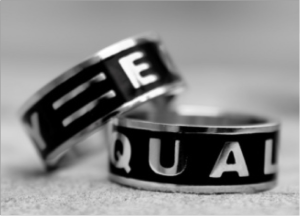“Why aren’t you and your boyfriend married after almost fourteen years of being together?” I’m often asked. “Well, it seems wrong to get legally married when many of our friends can’t,” I say. 
People often greet my response with an awkward silence. But, the pause is a question itself: What if heterosexual couples voluntarily refused the benefits of marriage that are denied to most of our gay and lesbian friends and family?
Last week, the issue of marriage equality roared back in the headlines when President Obama stated that he believes gay and lesbian Americans have a right to marry. While his speech was heavier on the rhetoric than the politics, it did capture a growing ideological shift amongst Americans, especially young voters, from that of antipathy to empathy to public support.
Obama’s statement is a watershed. Yet how do those of us who benefit from heterosexual privilege, yet believe in full citizenship for all Americans, push that needle of solidarity, and ultimately social change even further to the left?
Thus far, both right and left have sought to use boycotts as a political tactic. The conservative National Organization for Marriage’s (NOM) recently boycotted Starbucks because of the company’s support of the freedom to marry. Fortunately, five days after NOM launched its “Dump Starbucks” petition, it received only 19,000 signatures, compared to the nearly 250,000 individuals who have signed SumOfUs’s retaliatory “Thank You, Starbucks” card.
In contrast, following the passage of California’s Proposition 8, gay marriage advocates called for the boycotting of those companies and individuals who supported the ballot that decreed “only marriage between a man and woman as valid or recognized in the California.”
But if marriage equality is one of the major civil rights issues of our times, then should one of the most successful civil rights strategies—the boycott—be deployed against the institution of marriage itself?
Popular
"swipe left below to view more authors"Swipe →
In One Perfect Day: The Selling of the American Wedding, journalist Rebecca Mead reports that wedding industry is worth $160 billion to the US economy and has every interest in ensuring that weddings become more lavish and dresses become more expensive. On average, American wedding ceremonies cost $25,631; the average dress $1,458.
As a result of this huge economic incentive, groups like the youth-led National Marriage Boycott ask people to pledge to “deliberately forgo the privilege of marriage until it truly a right for all,” help repeal the Defense of Marriage Act and wear an equality ring as public symbol of their support.
For many, boycotting marriage might be too a radical proposition. Yale law professor Ian Ayres, co-author of the book Straightforward: How To Mobilize Heterosexual Support For Gay Rights, recently stated in an interview that “if you roll the clock back ten years ago, heterosexual couples sent wedding invitations to their friends and family, including their gay friends, without the slightest sense of unease.
“Now, there is often a slight sense of unease, and sometimes I even hear embarrassment, like the heterosexual couple feels strange for taking this wonderful benefit of marriage, when their loved friends who are gay cannot take that right. There are loving heterosexual couples who are choosing not to marry until marriage equality comes to their state.”
I, for one, have decided if I get married, it can only be in the handful of states that support marriage equality. Currently, I live in New Jersey, where Governor Chris Christie recently vetoed the state legislature’s passage of the gay marriage bill. New Jersey does have civil unions, but it is clearly defined as a legal arrangement between same-sex partners only. Even if a heterosexual couple wanted to be in legal solidarity with gay and lesbian couples here, our only options are privilege or renunciation.
At the time of his veto, Christie said he shared Obama’s position of supporting civil unions. Now Christie chides, “My position is really clear on it. It’s not going to change. I just do not believe that marriage should be between anyone but a man and a woman.”
The tide is changing. But clearly not fast enough.


